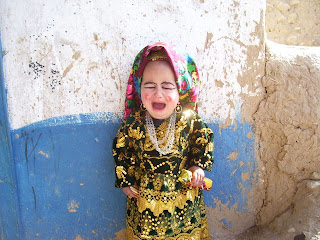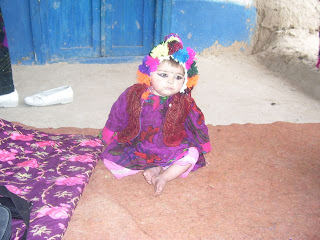A while ago I wrote about the practice of fasting here. Actually I started writing about fasting and drifted into other matters in my typical serious fashion… anyway. Today I’ll go back 1 month to the end of the month of fasting, and tell you what happened in what is perhaps the biggest of the “Eids” (annual holidays/celebrations) in this culture.
As I wrote a while back, the month of fasting is observed differently in different contexts. In this place, the majority of people were strict and devout about their fasting, even though they struggled to keep the fast through the intense summer heat. During the fast I talked with some people that I knew were not religious, and they said that even though they did not care about the fast, they could not risk anyone finding out that they do not fast. So, if the opportunity arose for them to take a drink of water on a day that was over 110, they would take it, but they said that because life is so communal, those chances usually do not come. As a result, everyone was grouchy for the whole month, tempers flared and fights broke out easily even in our office, and overall, productivity was pitiful. It was a hard time to be here, I was really discouraged for most of the month, and as the Eid at the end of the fasting approached, I was ready for some celebration.
In the week before Eid, the preparations we observed told us that this context makes a big deal about this Eid. Each evening we could hear the chanting of neighborhood boys going door to door singing out a traditional song, asking for money for the holiday. In the bazaar I saw the shopkeepers ramping up their stocks of sweets and goods that are special for Eid. I went out to buy some of these goods for ours guests and our visiting, and was amazed to find that almost every store had a sidewalk full of nuts, fruit, and candies to sell, even stores that typically sell only nails or paint! It was as if the whole town stopped their ordinary work to single-mindedly focus on one task: preparing for Eid.
For us, the day before Eid included the cooking of a feast for our office staff. All through Ramazan I had wanted to host an Iftar (breaking the daily fast in the evening), and finally we decided that we would do this on the last day of fasting. My wife was a little scared of cooking for the whole crew, and rightly so, because it was a big lot of them, and they’re not so easy to please. So we hired two local ladies to cook, and the guard and I ran for all the groceries. It was a fun day of seeing the party come together. We have a big enough patio that we could seat them all outside on a nice rug and cushions.


We did not regret getting help with the meal, because you need to be quite exact with the preparations for Iftar. Exactly 15 minutes before the night call to prayer, everyone can have some dates and fruit. Then they should be doing their prayers in prostrations at the time of the call to prayer, and after this, they can return to their supper and eat the main course. We served a meal calls Doshi: meat in tomato sauce with chickpeas, served over rice with raisins and carrots. It went over very well!
Still excited about how the Iftar feast went, I was ready to head out with an idea of my own on the first day of Eid. Tradition is that the first day of Eid is for families to visit one another, and that friends visit friends on days 2-3 (or 4 or 5!). I thought about the importance of day 1 in this culture, and tried to think of who might be left out of the celebrations on a day like this. I figured that one group of people that might be left out would be the old men that guard the stockpiles of animal feed on the river banks. These men were always in their little wood shacks, faithfully protecting the feed from theft, and I figured they would have to be there on the first day of Eid as well. I was wrong, the shacks were empty on the first day of Eid! So, I came home and talked with my wife to come up with plan B. She suggested police officers, so I grabbed my bags of Pepsi cans and cookies (what I planned to give to the men guarding the hay), and took off on motorcycle to look for policemen working on the first day of Eid. My wife’s idea was a winner! The policemen were so happy to be considered on the first day of Eid! I went intersection by intersection offering treats to the policemen directing traffic (they didn’t mind taking a break!). Then I headed out to the airport, and found the jackpot of policemen staying in a barracks just inside the grounds. I didn’t have enough pop for all of them, but they were still thrilled when I left all that remained with them. We had a brief chat, they remarked that no one has ever brought them something on their holiday, and they wished me well in my work here. After the “Happy Eid-e” for the policemen, my family just enjoyed a nice day together at home, and prepared for the visiting in the next days.
Visitation is a big deal here, especially during Eid.
Everyone is honored to have guests come to their homes, so we prepared a lot of bags of snacks and treats to take to neighbor’s houses.
We also had to be ready to go on “the tour of houses” with our project staff.
All the men went together on day 4, and the women on day 5.
Both times, the tour started by having everyone from the team come into our guest room, which we had prepared with lots of cookies, snacks, and candies.

The group sits down, eats some snacks, drinks some tea, says a prayer, and speedily moves on to the next place.
The men did not spend more than 10 minutes in each place, because there was an unspoken goal of finishing the visit to all 12 houses before noon.
The women took their sweet time, because they knew the office cook would make them lunch.
If my wife has not written about her time of visiting, I will bug her to do so, because it sounded like the women had more fun!
For me the highlight was seeing the homes of some staff I had not visited yet, and spending all the time driving around with the guys, sharing and laughing together.
Along with the team tours, we enjoyed visiting neighbors and some other friends at a slower pace. Little t did not accompany either of the tours (good thing, all that sugar would have put him over the top!), but we did enjoy taking him to visit neighbors and other friends. He is a joy to people here, because he does a good job of shaking hands and then putting his right hand over his chest to show honor. It seemed like wherever we went, it didn’t matter what we brought as a gift, just that we came. By the end of the 5 days we were pretty spent, but it had been such a worthwhile endeavor to try to really join this culture in their celebration.
To conclude, I’ll share one reflection I had while observing all the activities of Eid. As we went around town visiting homes, I noticed that everyone had a light spirit, as if all the insecurity and poverty that IS their lives did not matter on their holiday. I was amazed at the number of women and girls that walked the streets as they went place to place. I would be tempted to call it a taste of freedom, but that is probably overstatement. Perhaps the more appropriate term would be: reckless abandon. Yes, the place is insecure, and on most days there’s significant risk of something bad happening to you, but that didn’t matter on Eid. And yes, the whole society is strangled with poverty and lack of opportunity for any progress that the developed world would recognize, but during Eid everyone put on their best appearance of prosperity, and truly, many took the joy that they could from that day. Maybe you take this description as something to be happy about, or maybe you take it as something to be sad about. I was happy that the people of this city had one holiday in which the insurgents were quiet, and there were no incidents in our province. I was also sad to think that this was just one brief holiday, and that during the rest of the year this culture of hosting and visiting and being out and about is confined, muted, and struggling to survive. I am sad thinking that perhaps more aspects about this culture have also been pummeled into extinction by the war and poverty. Will this people ever emerge from these struggles to be a healthy society? Despite these shadowy reflections, I am also encouraged to keep the hope that the creator of this people can also bring peace, and restoration, and life. These are certainly things to keep in prayer.





























